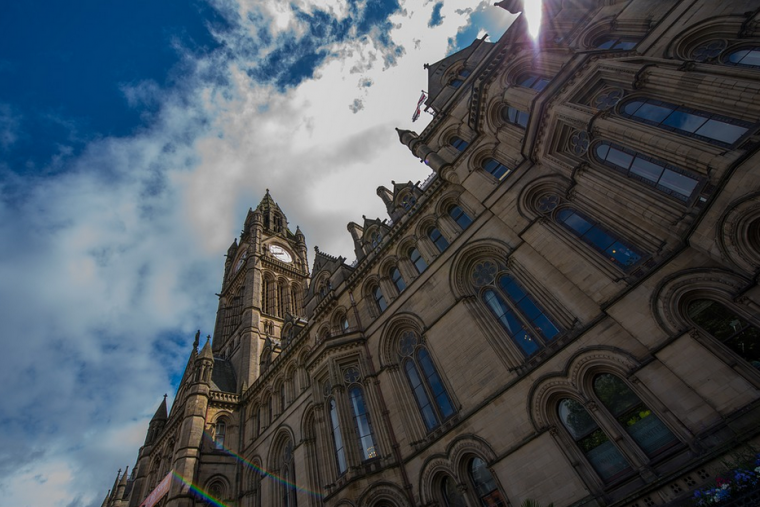'Sublime Christian heroism': The amazing history, culture and faith of Manchester

The horror is still fresh. It's hard to see the footage of scared teenagers rushing out of the Manchester Arena without imagining those that didn't make it out – and the lifelong devastating impact it will have on their families.
People from around the world have come together to express their sorrow over the events in Manchester. What fewer may realise, especially some of our American readers, is just what a remarkable place Manchester is.
Of course other cities across the UK and the world would have rallied around in the way Manchester has done – this isn't a competition. Yet the tragedy has highlighted what an extraordinary city Manchester can be.
I first went to Manchester Arena to watch a concert in 1996 at the age of 14. It's a special place.
In many ways, Manchester is where the modern world was invented. It was the cradle of the Industrial Revolution, with vast cotton mills and other factories still dotting the landscape – and those mill-workers were supporters of the American Revolution. Its damp atmosphere made it perfect for cotton manufacture and in the wake of this huge industry, others followed. The world's first steam passenger railway opened in 1830.
The iconic logo of Manchester that has been popping up in solidarity on social media this week – the worker bee – was indicative of the city's productivity.
Alongside the Industrial Revolution that was taking place, a political revolution was brewing. The Chartists, who were campaigning for better working conditions and the introduction of votes for all men, had a strong presence in Manchester. Fueled by members of Nonconformist churches and chapels, the Chartist movement was dealt a cruel blow when the Peterloo Massacre saw a peaceful demonstration of up to 80,000 people attacked by troops – 15 people were killed.
Far from blunting Manchester's radical history, this event was just the beginning. It prompted the great Romantic poet Shelley to write the immortal lines,
'Rise, like lions after slumber
In unvanquishable number
Shake your chains to earth like dew
Which in sleep had fallen on you:
Ye are many – they are few!'
The forerunners to Manchester University were founded around this time. It is now one of the largest and most respected in Europe. It was the first place in the world to split the atom in 1917 and the first modern computer in the world was made there in 1948. The Manchester Guardian was founded, later rebranded The Guardian and now one of the world's leading newspapers.
Upon the outbreak of the Civil War in the United States, Manchester experienced difficulty because of disruption to the cotton supply. When Abraham Lincoln imposed a cotton embargo, the destitution got worse, but in an extraordinary gesture of solidarity with the Union, Manchester workers agreed to support the embargo.
President Lincoln described it as an act of, 'sublime Christian heroism, which has not been surpassed in any age or in any country'. There is a statue of Lincoln in a Square named after him in Manchester.
The first meeting of the Trades Union Congress happened in Manchester, while the city was the home of the early suffragette movement which eventually won the right for British women to vote. The Free Trade Hall was home to the Halle Orchestra and was the venue where Bob Dylan was decried as 'Judas!' for daring to use an electric guitar.
Those Nonconformists, Anglicans and Roman Catholics (there was a large Irish community) were joined in Manchester by a thriving Jewish community – the city today is one of the top 50 in the world for Jewish population. Migration from South India has seen large Muslim, Hindu and Sikh populations too. The 'Curry Mile' is legendary.
Its industrial decline was long and by the late 20th century, Manchester was tired. At this point an extraordinary cultural renaissance took place. The Manchester music scene was born and bands such as the Smiths, Joy Division, New Order, The Stone Roses, The Happy Mondays and Oasis took over the airwaves of the world. They changed fashion and youth culture forever.
In 2006, I stood in Albert Square with my mum. It was packed. We were there to watch the Manchester Passion – a typically confident Manchester showing the world that the Easter story could be told anew using music from Manchester bands. After a false ending in which Jesus had died, the music restarted and the final glorious lines of The Stone Roses 'I Am The Resurrection' rang out among the crowds. Manchester felt like the centre of the universe.
Manchester music is the city's greatest export since the heyday of the cotton industry. It's what makes it even more galling that a concert was the scene of such carnage this week.
Manchester's sporting culture is also legendary. Football clubs Manchester City and Manchester United are iconic names the world over. England's cricket team play at Old Trafford, while the 2002 Commonwealth Games saw parts of the city regenerated.
A massive IRA bomb exploded in Manchester in 1996. We heard it for miles around. But remarkably, no one was killed, though many were injured. A large part of the city centre was damaged and destroyed, leading to a major renovation, which, tied into the musical and sporting dominance, led to talk of Manchester as the country's 'second city'. For many, both honorary Mancunians and those born and bred, it will always be the first city.
JB Priestley is reported to have said, 'What Manchester thinks today, the rest of England thinks tomorrow.' Given the inspirational response in the face of adversity this week, we can only hope he was right.
Follow Andy Walton on Twitter @waltonandy











